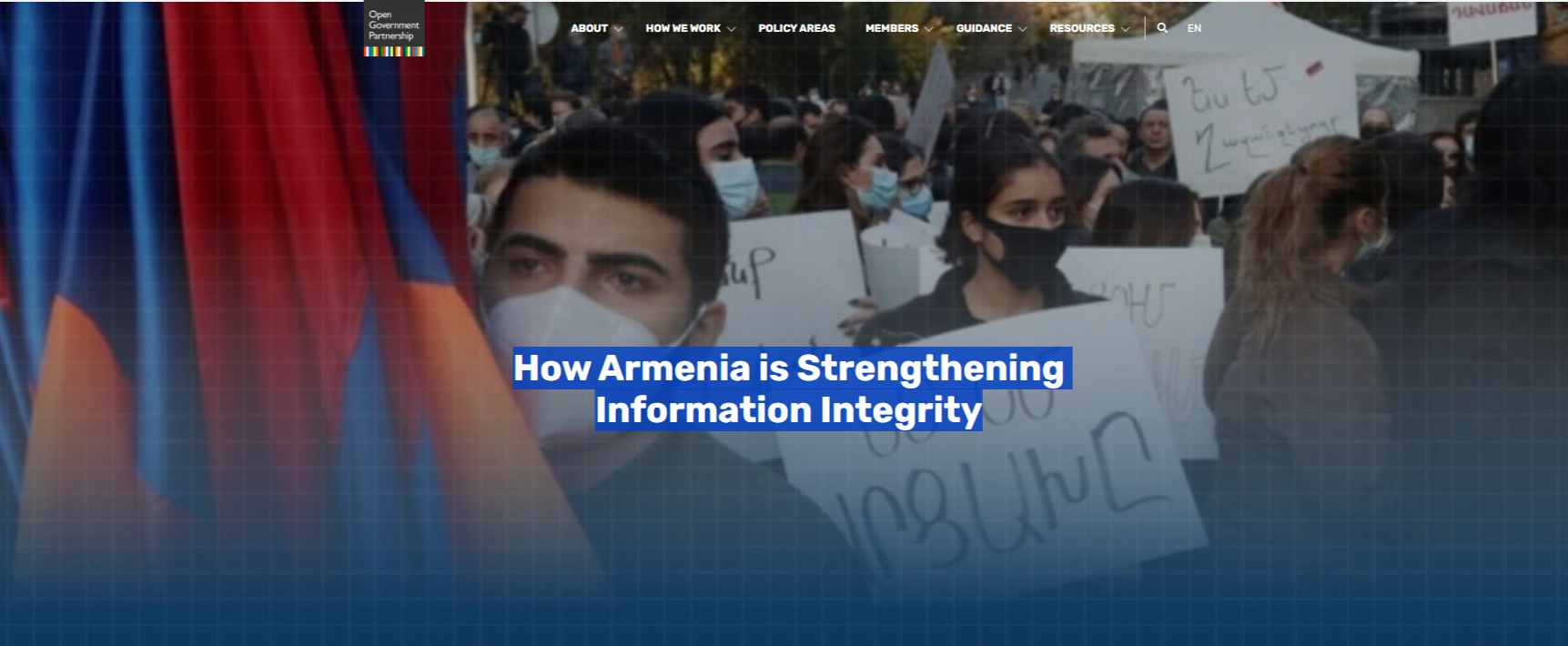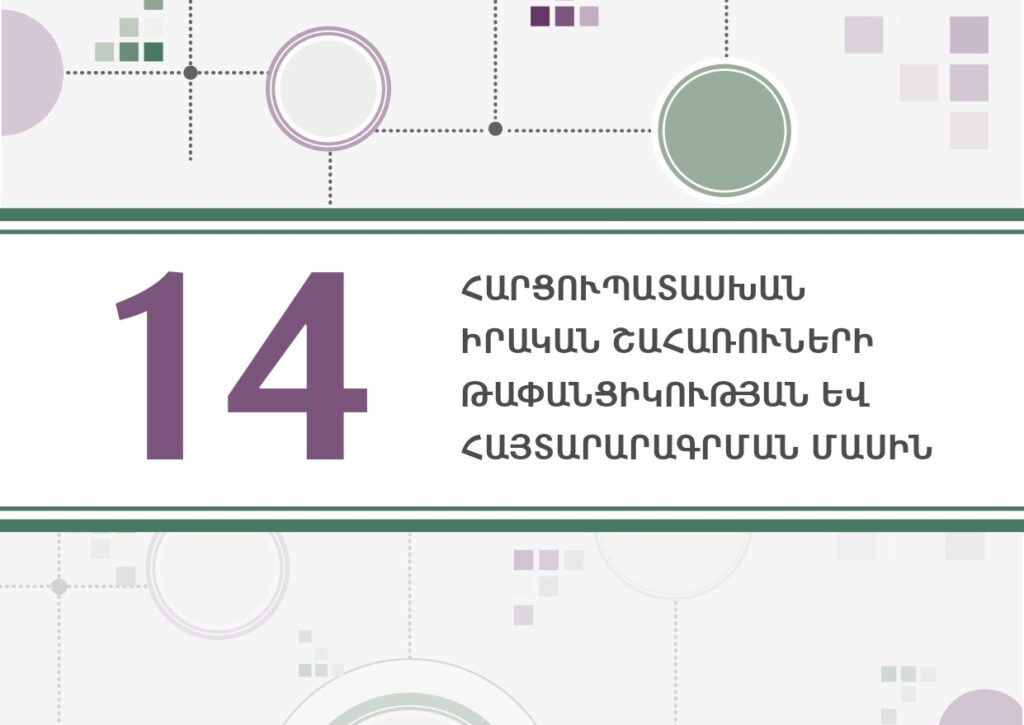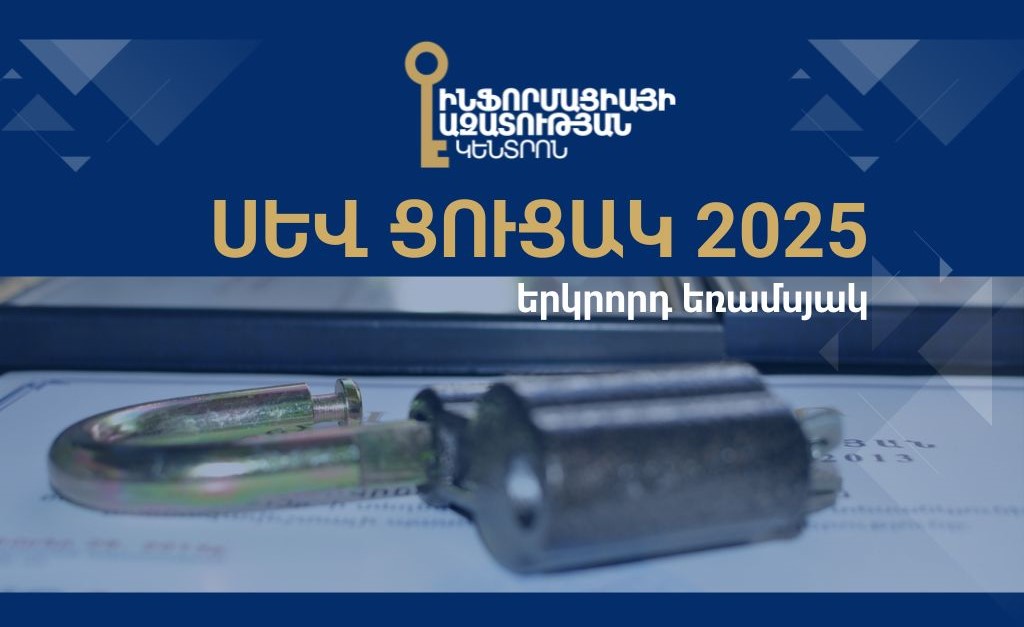By Shushan Doydoyan
Freedom of Information Center Head
The general situation in terms of access to public information in Armenia during the pandemic times was a bit chaotic and unorganized especially in the beginning phase. Armenian Government instituted a state of emergency on March 16. Apparently, the restrictions on freedom of expression and information were ineffective, non-proportional, and unreasonable and contradict public interest under the conditions of the pandemic.
One of the provisions was a ban on publishing or sharing any information on the outbreak that didn’t come from the Armenian government or other countries’ official sources. Please, note that media was not allowed even to site to international sources of information.
Another restrictive provision was the ban on panic-provoking info and the demand to publish only official viewpoints. The definition of panic-provoking information was so unclear and allowed the authorities of discretionary application of these provisions. It was up to the police to decide whether a publication is panic-provoking, or not. There is also a problem of lacking a clear procedure for providing the requested information and appointment of a responsible authority by the Government.
Although the Article 7 of the FOI The law defines that Information holder agency should urgently publicize or via all accessible means inform the public about the information, the publication of which can prevent dangers facing ….. public health, however, there are no concrete procedures for fulfilment of this important provision.
Once the restrictive measures were adopted, the police have taken an expansive view of what they consider a violation of those rules.
To note, there is an administrative viability for not abiding by the media restriction rules. In such cases, 100 to 300 thousand AMD fines will be imposed on the media. And if the media entity does not remove the publication after being fined, a new, 500 thousand to 1 million AMD fine will be imposed.
For example, the newspapers and websites Hraparak was forced to delete a story about prisoners complaining that the outbreak meant that they couldn’t receive packages from outside. Armenian Public Television, the government’s primary source for disseminating official information, was also forced to delete a piece that cited CNN saying that in Iran, people were dying of coronavirus at the rate of one death every 10 minutes.
Those restrictions were criticized by a number of media organizations which issued a joint statement on March 20, 2020.
Reporters Without Borders also expressed a concern in its Twitter page “#Coronavirus #Armenia declares state of emergency and compels media to quote only official sources. Controlling infos doesn’t help to fight epidemia but spread rumors and fear!”.
On March 24, 2020 the OSCE Representative on Freedom of the Media, Harlem Désir, expressed his concerns about a package of amendments to the criminal and administrative codes, in the context of the fight against disinformation related to the COVID-19 pandemic. “Publishing only information provided by the authorities is a very restrictive measure which would limit freedom of the media and access to information disproportionately,” he said.
Followed after this statement, the government organized an internal discussion with CSOs and based on these discussions on March 25 the authorities made some positive changes to the restrictions of the media activities.
The obligations imposed on the media were complemented and changed. In particular, it was defined that if Coronavirus-related stories are re-published from the foreign media, their source should be mentioned in the headline of the Armenia version. It was also defined that if a media entity publishes a story on isolated, self-isolated, and Coronavirus-positive Armenian citizens and epidemic measures, it is necessary to attribute the commandant’s office, totally republishing the official information without editing.
Those changes completely reflect the suggestions that the civil society had presented to the government.
Access to Information
Another problem related to FOE/FOI are delayed answers to the information requests of the media and CSOs, as well as the low level of proactive publication of information by the official web sites in the beginning of pandemic.
Many information requests were delayed, violating the 5-day time frame set by the FOI law. Our observations confirm that late answers are not due to a tendency to hide information, but mainly due to the lack of internal coordination within the system. The government-launched electronic tools, such as e-request.am, which significantly reduce the time and technical resource costs by increasing the efficiency of citizen-state communication, have had a major impact on the positive dynamics in terms of timing.
We also registered mute refusal cases when no answer was received. The rate of unjustified refusals and incomplete answers was increased. In some cases this indicated that while some officials previously avoided providing information and left information requests unanswered, during pandemic the requests for sensitive information were rejected without proper justification.
There have been problems also in terms of proactive transparency of the government. The FOICA observations show that proactive disclosure rules provided by the FOI law were not properly enforced by the government, especially in the initial phase of pandemic. Although the government launched a special FB page and a web site to update the public on pandemic issues, however in come cases these different web resources were not synchronized and correspond to each other. It is crucial that the government published as much information as possible in a proactive manner.
ATI Law “secret” amendments
A negative step was the hidden activity of the Ministry of Environment that initiated new legislative amendments to the Freedom of Information Law that were adopted at the Government session on April 2. We are busy with pandemic issues, while this state body could act for its adoption.
According to the civil society, the draft restricts the right of the public on access to environmental information and to participate in the decision-making process. On April 3, the RA Human Rights Defender published a negative opinion on this draft. Reporters Without Borders international organization announced on April 2 that the initiative violates the principle of transparency of the RA Government (see: https://twitter.com/RSF_en/status/1245787373901885440).
On April 6, the Armenian National Platform of the Eastern Partnership Civil Society Forum, which unites more than 230 Armenian CSOs, as well as tens of other non-governmental organizations, issued a statement urging the Armenian government to immediately repeal the Freedom of Information Act draft and not to submit it to the National Assembly for further consideration, as it does not comply with national legislation and international regulations on freedom of information.
To note, no proper public discussions took place over the draft and the RA Ministry of Environment violated the provision of Article 8 of the Aaurhus Convention. Therefor, the Civil society calls on the Government and the Parliament to immediately abandon this initiative, take a responsible and systematic approach to the process of amending the FOI law, and before proposing any changes, consult with representatives of non-governmental organizations and experts. The creation of draft laws without open and transparent discussions disrupts the mechanisms of CSO-state cooperation and weakens the public’s trust in the state. At present, the draft is already in the Parliament standing committee on Environment and will be discussed soon.
Data Protection in Pandemic times
I think that the Government should be maximum transparent and accountable as possible when using tracing tools.
On March 31, 2020 the RA National Assembly adopted a bill, which will give the government additional tools to fight the pandemic under the State of Emergency at the same time limiting the citizens’ rights to the protection of personal data, privacy, freedom of communication.
There has been a lot of criticism towards the government because of non-compliant processing of personal data of the citizens for many reasons.
First, there is no sufficient justification of the legal aim of processing personal data. The existence of appropriate legal aim is crucial even before starting the processing itself. Also, the framework of the processed personal data was too wide and the principle of symmetry was breached. For example, there was no enough explanation how the time or duration of the person’s call to his/her friend will be used to prevent spreading the disease.
Third, there has been no evidence that the processed personal data will be preserved properly and securely. The data is preserved by the government company EKENG, which even does not passed an appropriate security audit and does not possess the ICO standards compliance.
Forth, the duration of preservation of the collected data was defined a month after emergency situation is over. It’s too long period and unjustified. The government plans to set up a commission to destroy the data, which may include representatives of parliamentary parties and experts. Its very unclear too.
And finally, in the beginning the software of the tracing system was first purchased from the Iranian government, because of which the Armenian IT companies and CSOs raised a concern over this vulnerable issue. Then an unknown Armenian company voluntarily developed another soft for the government, and this deal still remained unclear for the society, why the company didn’t get a payment for developing such an important tool for the government, what company is it, how it was selected, still a secret. IT professionals are concerned about the soft program created by this company and the EKENG server security guarantees, as well as the fact that the process is monitored by the National security services.
I think that privacy restrictions are acceptable only at the minimum scale, necessary for achieving the set goals. Hence, the government must adhere to the principle of proportionality, as well as make sure that the restrictions are exercised with maximum transparency. The government is accountable to the public even under the State of Emergency and is not exempt from responsibility for its actions.
The public need to get sufficient information on which institutions (be them public or private) are analysing the personal data of the citizens, what is being done to ensure the adequate level of protection and security of the data, as well as provide clear information on the results achieved by the implementation of these measures. I also find it crucial to provide mechanisms for public oversight of data collection and processing.
To summarize, in order to effectively fight against the pandemic, states should take every step necessary to ensure open and proactive access to the information on Covid-19 related projects and activities. Wider society should have the opportunity to get updates and hold government accountable. Proactive provision of information about government activities will ensure higher public trust and confidence towards their governments and mobilize collective efforts for pandemic crisis management. At the same time, access to regularly updated data on websites of particular public institutions ensures that journalists and other interested parties can easily obtain data and make their own analysis. To note, such a proactive approach will ease the administrative burden and resources of public institutions.











